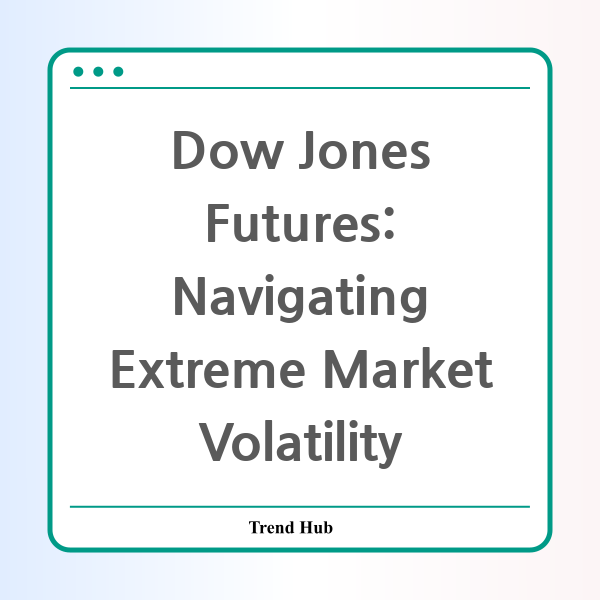* This website participates in the Amazon Affiliate Program and earns from qualifying purchases.

The financial markets have been on a wild ride lately, especially with the Dow Jones futures reflecting a significant level of instability. The recent volatility has left investors grappling with uncertainty about the future—a situation exacerbated by President Trump's aggressive tariff policies. As we delve deeper into this tumultuous landscape, one must question: how will this impact our economy and investment opportunities?
On a particularly chaotic trading day, Wall Street experienced severe swings, showcasing the tense atmosphere among investors. U.S. stocks opened the day in bear market territory, a stark reminder of the sharp decline seen amidst international market turmoil. Rumors circulated that the Trump administration might halt tariffs, providing a brief moment of hope as stocks surged. However, these rumors quickly fizzled out after clarification from the White House, leading to renewed declines. The Dow ultimately closed down by 349 points, or 0.91%, reflecting the pervasive fear and uncertainty hanging over the market.
With the broader S&P 500 index also falling and the Dow intraday fluctuating as traders weighed the potential for negotiations, the volatility was a clear indicator of the market’s fragile state. The surge in the Cboe Volatility Index (VIX), which measures market risk and investors’ sentiments, further underscored the fear gripping Wall Street—closing at its highest point since the onset of the pandemic. Such volatility is not typical; it signals a market eager for clarity and stability.
Why does the market react so drastically to news regarding tariffs? The relationship between tariffs and economic health is profound. As tariffs rise, costs for goods increase, leading to inflation and potential decreases in consumer spending. Already, companies are bracing for the impact, with many analysts scaling back growth expectations as earnings reports loom closer. This has prompted a cautious approach among investors, some of whom are sensing potential buying opportunities amid what appears to be a historical dip in stock prices.
Moreover, it’s important to note that the unpredictability of international relations, particularly in light of Trump's tariff announcements, has sent shockwaves through global markets. As seen in Europe and Asia, stocks have similarly plummeted. The uncertainty surrounding trade relations has not only affected investor sentiment in the U.S. but has also contributed to bearish trends in foreign markets, leading to a worldwide concern regarding economic stability and growth prospects.
As we continue to monitor the situation, several factors will influence how the Dow Jones futures and other major indices respond in the coming weeks. First, will the Trump administration provide any definitive guidance on tariff negotiations? Second, how will businesses adapt to the new costs associated with tariffs? Finally, will consumer confidence waver, leading to broader implications for the U.S. economy? Investors must remain vigilant and informed as these developments unfold.
In conclusion, the current climate indicates that we are in for a tumultuous period in the financial markets. The extremes of volatility remind investors of the interconnectedness of global trade and the stock market. As we navigate through these uncertain waters, staying informed and strategically agile will be paramount. The dance of the Dow, amid tariff talks and economic forecasts, will continue to keep all eyes on the markets.
* This website participates in the Amazon Affiliate Program and earns from qualifying purchases.